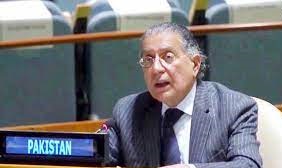CPEC’s Gwadar Port occupies a strategic location: Pakistan tells UNSC

Islamabad: Pakistan has told the UN Security Council that Pakistan’s Gwadar Port, which is part of the China-Pakistan Economic Corridor (CPEC), occupies a strategic location overlooking the Strait of Hormuz and the North Arabian Sea.
In a written statement a virtual meeting of the UNSC, Pakistan’s Permanent Representative to the UN, Ambassador Munir Akram said that it placed Pakistan at a point of convergence, linking active sea-lanes to landlocked Central Asian Republics for shipment of oil, coal and agricultural products.
He said the success of the CPEC and the Gwadar Port project was linked to the safe and secure maritime environment in the Indian Ocean region in general and the Arabian Sea in particular.
Ambassador Akram said it was of upmost importance to keep the Sea Lanes of Communication (SLOC) open and protect Pakistan’s coast as well as the ports of Karachi, Bin-Qasim, Ormara and Gwadar.
“Accordingly,” he said, “a special organization known as Task Force-88 (TF-88) has been created and assigned the duty for the seaward security of Gwadar Port and protection of associated sea lanes against both conventional and non-traditional threats.”
“We are proud that Pakistan Navy continues to maintain a robust security posture along Pakistan’s coast and in the regional seas, in order to prevent nefarious elements from illicit activities in the maritime domain,” the Pakistani envoy said.
The Pakistan Navy, he said, had always been appreciated for its efforts to promote peace and security. Among others, it has been actively participating in the Combined Task Forces 150 and 151 in the larger interest of the international community and regional maritime security.
Since 2013, he added, Pakistan was operating a Joint Maritime Information Coordination Centre (JMICC). It gathers and shares all required information among all the national stakeholders for maritime domain awareness.
“Our Navy has also provided valuable assistance at the high seas to vessels in distress, including during anti-piracy operations, and has extended humanitarian assistance to regional countries on several occasions,” he said.
The Pakistani envoy also said that piracy and armed robbery against ships remained a major threat to maritime security.
“Transnational criminal groups, such as those in the Gulf of Aden, on the coast of Somalia and in the Gulf of Guinea, are involved in multiple illegal activities, including drug trafficking, weapons smuggling, migrant-smuggling, trafficking in persons, piracy, and armed robbery and, in some cases, terrorist activity”, he said.
“The link between transnational organized crime at sea and the threat that it poses to the stability, security and economies of both coastal and landlocked States is visible and a matter of grave concern.”
To meet the challenges posed by this large-scale phenomenon, Ambassador Akram called for development of a robust regulatory framework and a coordinated and comprehensive approach at the national, regional and international levels to address it.”
Pakistan, he said, had a strategic stake in peaceful navigation and security of the Indian Ocean region, noting that Islamabad’s interests emanated from over 1000 kilometers long coastline, an Exclusive Economic Zone (EEZ) of around 290,000 square kilometers, Karachi port and the newly built deep seaport of Gwadar.
“Pakistan is an important stakeholder in the Indian Ocean security framework, which includes counter-piracy as well as human trafficking and narcotics smuggling,” the ambassador said.
“We are also concerned at the politicization of the law of the sea and UNCLOS (The United Nations Convention on the Law of the Sea ) by some member states in recent years,” the Pakistani envoy said, in reference to the issues in South China Sea.
“When it comes to pacific settlement of maritime disputes, we should fully respect efforts made by the countries concerned to resolve these and thus safeguard peace and stability. The countries outside the region should respect the negotiations or the process through which the parties concerned want to resolve such issues,” he added.





